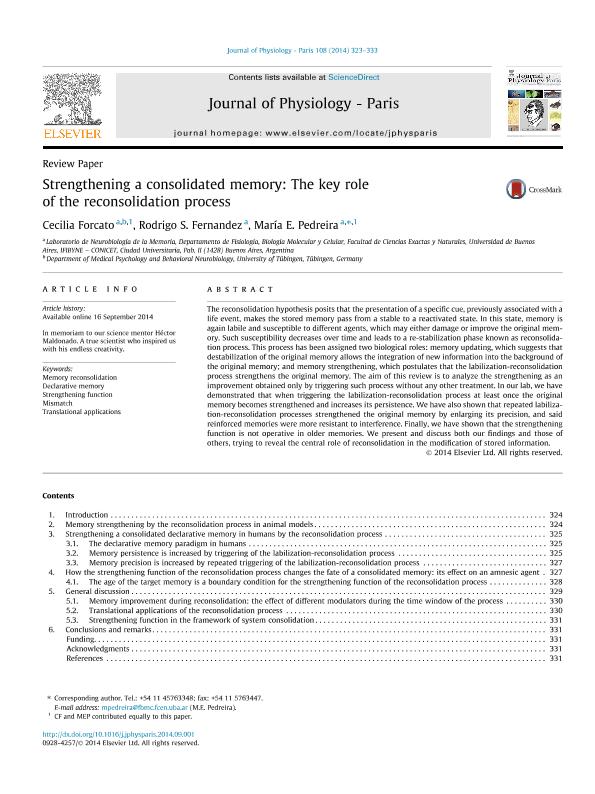Mostrar el registro sencillo del ítem
dc.contributor.author
Forcato, Cecilia

dc.contributor.author
Fernández, Rodrigo Sebastián

dc.contributor.author
Pedreira, Maria Eugenia

dc.date.available
2018-01-12T20:08:23Z
dc.date.issued
2014-09
dc.identifier.citation
Fernández, Rodrigo Sebastián; Forcato, Cecilia; Pedreira, Maria Eugenia; Strengthening a consolidated memory: The key role of the reconsolidation process; Elsevier; Journal of Physiology; 108; 4-6; 9-2014; 323-333
dc.identifier.issn
0928-4257
dc.identifier.uri
http://hdl.handle.net/11336/33177
dc.description.abstract
The reconsolidation hypothesis posits that the presentation of a specific cue, previously associated with a life event, makes the stored memory pass from a stable to a reactivated state. In this state, memory is again labile and susceptible to different agents, which may either damage or improve the original memory. Such susceptibility decreases over time and leads to a re-stabilization phase known as reconsolidation process. This process has been assigned two biological roles: memory updating, which suggests that destabilization of the original memory allows the integration of new information into the background of the original memory; and memory strengthening, which postulates that the labilization-reconsolidation process strengthens the original memory. The aim of this review is to analyze the strengthening as an improvement obtained only by triggering such process without any other treatment. In our lab, we have demonstrated that when triggering the labilization-reconsolidation process at least once the original memory becomes strengthened and increases its persistence. We have also shown that repeated labilization-reconsolidation processes strengthened the original memory by enlarging its precision, and said reinforced memories were more resistant to interference. Finally, we have shown that the strengthening function is not operative in older memories. We present and discuss both our findings and those of others, trying to reveal the central role of reconsolidation in the modification of stored information.
dc.format
application/pdf
dc.language.iso
eng
dc.publisher
Elsevier

dc.rights
info:eu-repo/semantics/openAccess
dc.rights.uri
https://creativecommons.org/licenses/by-nc-nd/2.5/ar/
dc.subject
Declarative Memory
dc.subject
Memory Reconsolidation
dc.subject
Mismatch
dc.subject
Strengthening Function
dc.subject.classification
Otras Ciencias Biológicas

dc.subject.classification
Ciencias Biológicas

dc.subject.classification
CIENCIAS NATURALES Y EXACTAS

dc.title
Strengthening a consolidated memory: The key role of the reconsolidation process
dc.type
info:eu-repo/semantics/article
dc.type
info:ar-repo/semantics/artículo
dc.type
info:eu-repo/semantics/publishedVersion
dc.date.updated
2018-01-12T19:50:03Z
dc.journal.volume
108
dc.journal.number
4-6
dc.journal.pagination
323-333
dc.journal.pais
Países Bajos

dc.journal.ciudad
Amsterdam
dc.description.fil
Fil: Forcato, Cecilia. Consejo Nacional de Investigaciones Científicas y Técnicas. Oficina de Coordinación Administrativa Ciudad Universitaria. Instituto de Fisiología, Biología Molecular y Neurociencias. Universidad de Buenos Aires. Facultad de Ciencias Exactas y Naturales. Instituto de Fisiología, Biología Molecular y Neurociencias; Argentina
dc.description.fil
Fil: Fernández, Rodrigo Sebastián. Consejo Nacional de Investigaciones Científicas y Técnicas. Oficina de Coordinación Administrativa Ciudad Universitaria. Instituto de Fisiología, Biología Molecular y Neurociencias. Universidad de Buenos Aires. Facultad de Ciencias Exactas y Naturales. Instituto de Fisiología, Biología Molecular y Neurociencias; Argentina
dc.description.fil
Fil: Pedreira, Maria Eugenia. Consejo Nacional de Investigaciones Científicas y Técnicas. Oficina de Coordinación Administrativa Ciudad Universitaria. Instituto de Fisiología, Biología Molecular y Neurociencias. Universidad de Buenos Aires. Facultad de Ciencias Exactas y Naturales. Instituto de Fisiología, Biología Molecular y Neurociencias; Argentina
dc.journal.title
Journal of Physiology

dc.relation.alternativeid
info:eu-repo/semantics/altIdentifier/url/http://www.sciencedirect.com/science/article/pii/S0928425714000448
dc.relation.alternativeid
info:eu-repo/semantics/altIdentifier/doi/http://dx.doi.org/10.1016/j.jphysparis.2014.09.001
Archivos asociados
